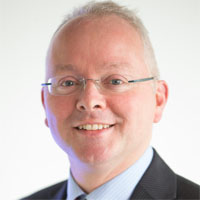Conférence Thermo Scientific avec le Professeur Albert Heck

Titre : A Multi-Angular View at Protein Phosphorylation by Mass Spectrometry.
Endroit : Pavillon Roger-Gaudry, salle G-715 à 11 h
Hôte : Professeur Pierre Thibault
Cette conférence sera prononcée par le Professeur Albert Heck, titulaire de la Chaire en spectrométrie de masse biomoléculaire et en protéomiques associées aux département de chimie et de sciences pharmaceutiques de la Utrecht University. Elle est commanditée par la société Thermo Scientific et sera donnée en anglais.
Résumé : Phosphorylation of proteins directly influences their activity, conformation, localization, oligomeric state and/or binding to interaction partners. Due to this wide range of outcomes, diverse and multidimensional analyses are required to fully monitor and understand the structural and functional consequences of a protein phosphorylation event. Preferably, such assays should follow both auto- and substrate-phosphorylation, and thus monitor the substrate and the kinase simultaneously. Presently, protein phosphorylation is often investigated at unconnected levels.
First, at the protein sequence level phosphoproteomics data can be gathered on site-specific phosphorylation, the sequence motifs recognized by a kinase and possible cross-talk between different modified sites. Secondly, kinetic biochemical analysis can provide data on the reaction rates of each enzyme-substrate pair, requirements of co-factors or certain environmental conditions for kinase activation, deactivation and inhibition. Thirdly, a range of structural effects of the phosphorylation event can be interrogated, for example changes in conformation, oligomeric state, protein complex formation or dissociation by using structural biology methods such as NMR, X-ray crystallography and electron microscopy.
In this lecture I will describe various (new) ways in which mass spectrometry can be of help to study these different aspects of protein phosphorylation, thereby focusing on new enrichment methods, proteases, and fragmentation techniques of use for shot-gun phosphoproteomics. Additionally, I will describe top-down proteomics, and native mass spectrometry based technologies and how they can be used in direct reaction monitoring by mass spectrometry of structural and functional aspects of enzyme/substrate relationships.
Location: Université de Montréal - Pavillon Roger-Gaudry